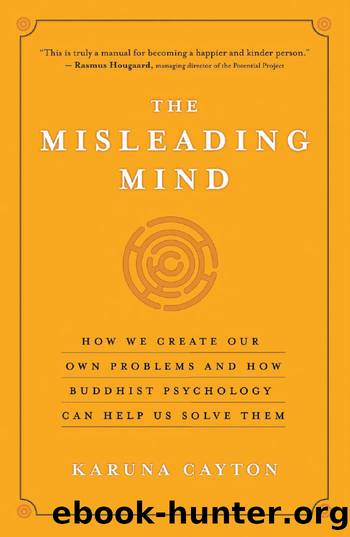The Misleading Mind by Karuna Cayton

Author:Karuna Cayton
Language: eng
Format: epub
ISBN: 9781577319436
Publisher: New World Library
STUCK IN TRAFFIC
One aspect of this distorted perspective, explained extensively in Buddhist psychology, is that we come to regard people, things, events, and even thoughts and feelings as independent realities or entities. Nothing exists independently. First, as weâve seen, our perception labels and colors reality, so we canât know anything as it is in any truly objective, independent way. This is true for us, and itâs true for everyone. Everyoneâs perspective is partial, and there is always a larger context to everything that happens â but we forget this. We see the world fragmentally, like the jerky images of a slide show, but we act as if we are directors of a movie, as if we could predict and shape the arising flow of experience.
For instance, ask yourself, how calm are you in traffic? Do you ever suffer from road rage? If you are someone who never gets agitated while driving, my hatâs off to you. But most of us find it extremely difficult to maintain our sense of emotional balance on the road, and some people literally go insane at the mere possibility that they will be five minutes late. However, traffic is a perfect arena to practice tolerance of unpredictability, and acceptance of our lack of control, while remaining calm.
According to news reports, road rage is on the rise, but why? Today, there are more vehicles on the road, more people driving, and more congestion than ever before. Armed with this knowledge, why do we still get so uptight, angry, and frustrated when we encounter traffic? Shouldnât we expect it? Or is expecting it part of the problem? Could it be the way we see the situation? If we saw it differently, would it help? In truth, âbad trafficâ does not exist as some independent entity like we think it does. It exists only in its relationship to oneself.
Traffic is only âbadâ within the larger context of our labels, assumptions, and expectations. When are we the most frustrated by traffic? When we are trying to get somewhere specific at an exact time. We have âplans,â sometimes âimportantâ plans; to be late could upset an entire world of desires and needs and expectations, which we share with the people expecting us. Then, when we encounter âbad traffic,â our desires get thwarted, the future weâve conceived of and planned for is threatened, and we experience rage at this loss of control. The strength of our emotional reaction is typically equivalent to the rigidity of our concepts.
Consider the opposite: What happens on a road trip, when you have no firm destination or timetable? Maybe, as cars back up and everyone slows to a crawl, you get annoyed, but your expectation is to âenjoy the road,â so you do. You donât have a fixed timetable. You go with the flow, or take a scenic detour, and let your annoyance go. Thus, our experience of âtrafficâ is directly related to the mental picture we created, consciously or subconsciously, before we left our house or office.
Download
This site does not store any files on its server. We only index and link to content provided by other sites. Please contact the content providers to delete copyright contents if any and email us, we'll remove relevant links or contents immediately.
The Concise Laws of Human Nature by Robert Greene(1888)
Bioenergetica by Alexander Lowen(1467)
After by Bruce Greyson(1402)
The Child in You by Stefanie Stahl(1246)
No Bad Parts by Richard C. Schwartz(1227)
Stress-Proof Your Brain The Yogic Way: Unique Ancient Indian Techniques to End Toxic Stress, Stop Worrying and Inculcate Mental Toughness by Advait(1121)
Talk of the Ton by unknow(1050)
The Power of Myth by Joseph Campbell & Bill Moyers(1047)
Badass Habits: Cultivate the Awareness, Boundaries, and Daily Upgrades You Need to Make Them Stick by Jen Sincero(1034)
Chakras & Self-Care by Ambi Kavanagh(956)
Living a Life of Awareness by Don Miguel Ruiz Jr(919)
Self-Care for Empaths by Tanya Carroll Richardson(904)
Learn To Think Using Thought Experiments by King Patrick(902)
The Mind by E. Bruce Goldstein(893)
The 7 Secrets of Sound Healing Revised Edition by Jonathan Goldman(874)
Curative Magic by Rachel Patterson(873)
The Quantum Psychiatrist: From Zero to Zen Using Evidence-Based Solutions Beyond Medication and Therapy by Biswas Dona(871)
The Tao of Intimacy and Ecstasy by Solala Towler(857)
The Anxiety First Aid Kit by Rick Hanson(845)
